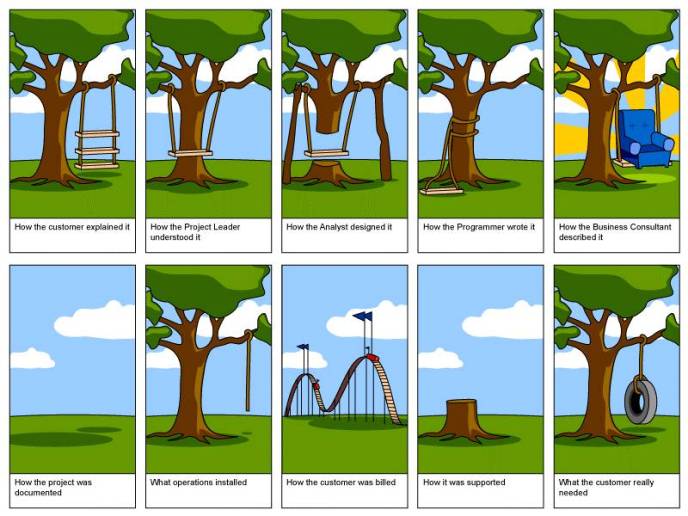Why Continuous Quality Improvement is important
Continuous Quality Improvement is important because it provides:
- Delivery of high-quality of service to the customer
- High performance through process efficiency
- Fostering a cohesive team
- Reduces non-value-added activity and waste
- Reduces cost
- Safety in the working environment
The breakdown of silos and the "We have always done it this way" philosophy
A Continuous Quality Improvement organization is never satisfied with the status quo. "If it is not broken, then let's make it better."
Continuous Quality Improvement drives organizational clarity that ultimately leads to a high quality of service provided to customers.
In this photo, a customer's expectation is completely different from that explained at various levels of the organization. For an organization to be successful, everyone must be on the same page to deliver quality to customers.

For an organization to become a quality organization, it must be aligned at all parts. The following are W. Edward Deming's 14 Points for Total Quality Management:
- Create constancy of purpose for improving products and services.
- Adopt the new philosophy.
- Cease dependence on inspection to achieve quality.
- End the practice of awarding business on price alone; instead, minimize total cost by working with a single supplier.
- Improve constantly and forever every process for planning, production, and service.
- Institute training on the job.
- Adopt and institute leadership.
- Drive out fear.
- Break down barriers between staff areas.
- Eliminate slogans, exhortations, and targets for the workforce.
- Eliminate numerical quotas for the workforce and numerical goals for management.
- Remove barriers that rob people of pride of workmanship, and eliminate the annual rating or merit system.
- Institute a vigorous program of education and self-improvement for everyone.
- Put everybody in the company to work accomplishing the transformation.
These total quality management principles can be put into place by any organization to more effectively implement total quality management. As a total quality management philosophy, Deming's work is foundational to total quality management and its successor, quality management systems.
Learn more about W. Edwards Deming's 14 Points for Total Quality Management